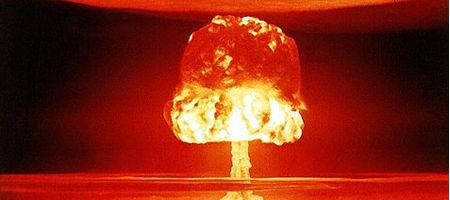The Doomsday Clock – which represents how close the human race is to destruction – has been moved a minute closer to midnight, thanks to concerns over climate change and international tension.

The last time the clock was changed was in January 2010, when its minute hand was pushed back one minute from five to six minutes before midnight.
But apparently we’ve all been very naughty boys and girls since then.
“The provisional developments of two years ago have not been sustained, and it makes sense to move the clock closer to midnight, back to the value it had in 2007,” explains Lawrence Krauss, co-chair of the board of sponsors of the Bulletin of the Atomic Scientists (BAS), which runs the clock.
“Faced with clear and present dangers of nuclear proliferation and climate change, and the need to find sustainable and safe sources of energy, world leads are failing to change business as usual.”
Founded in 1945 by University of Chicago scientists who’d helped develop the first atomic weapons in the Manhattan Project, the Bulletin of the Atomic Scientists created the Doomsday Clock in 1947.
The decision to move the clock’s hands is made by the BAS’s Board of Directors and Board of Sponsors, which includes 18 Nobel Laureates.
“The global community may be near a point of no return in efforts to prevent catastrophe from changes in Earth’s atmosphere,” says Allison Macfarlane, chair of the BAS Science and Security Board.
“The International Energy Agency projects that, unless societies begin building alternatives to carbon-emitting energy technologies over the next five years, the world is doomed to a warmer climate, harsher weather, droughts, famine, water scarcity, rising sea levels, loss of island nations, and increasing ocean acidification.”
The risk of nuclear war has also risen over the last two years, says the BAS.
“Failure to act on the Comprehensive Test Ban Treaty by leaders in the United States, China, Iran, India, Pakistan, Egypt, Israel, and North Korea on a treaty to cut off production of nuclear weapons material continues to leave the world at risk from continued development of nuclear weapons,” says Jayantha Dhanapala, a member of the BAS Board of Sponsors.






